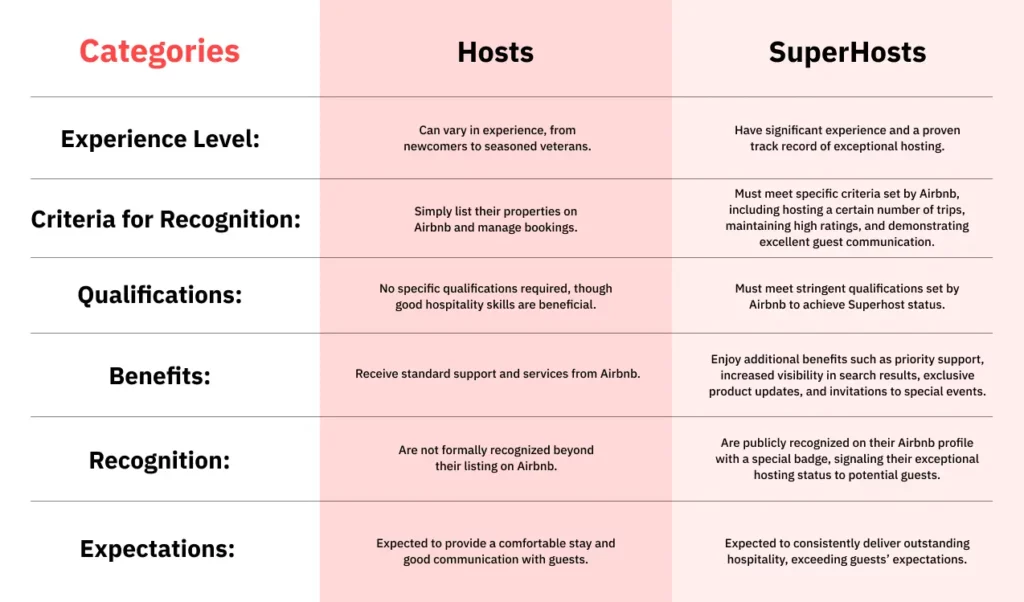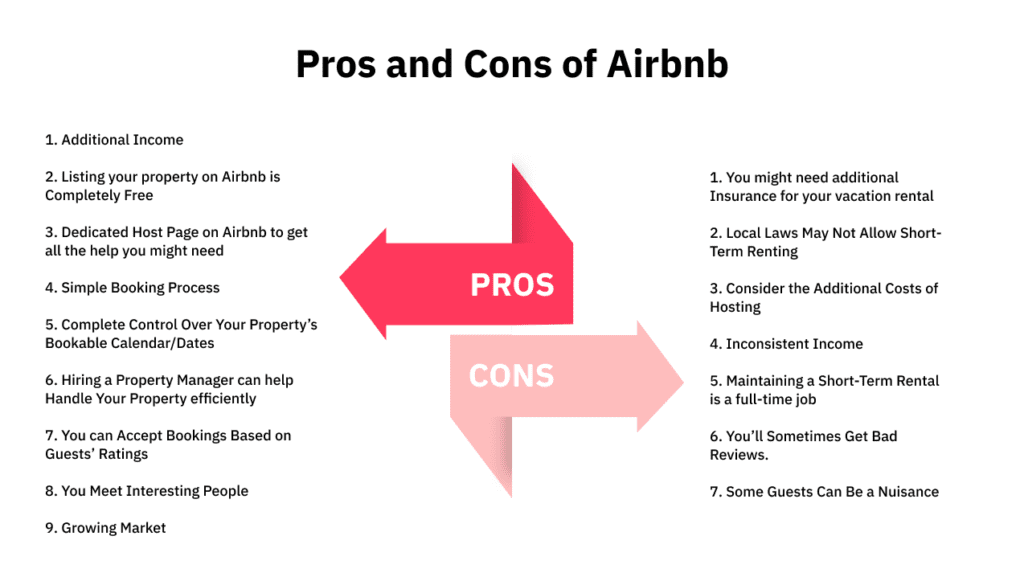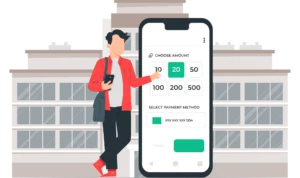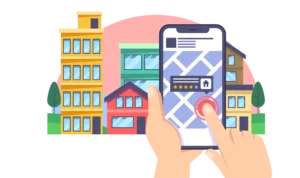Airbnb has revolutionized how people travel by allowing them to stay in unique accommodations worldwide, often at a fraction of the cost of traditional hotels. This has intrigued many and has raised the question: ‘How does Airbnb Work?’ In this article, we explore this and many other related questions that’ll help you understand Airbnb better before becoming an Airbnb host yourself.
What Does Airbnb Mean?
Airbnb is an online marketplace and platform that allows people to list, discover, and book accommodations around the world. It connects property owners (hosts) who have spaces to rent, such as homes, apartments, or even individual rooms, with travelers or guests looking for short-term stays. The platform operates through its website and mobile app, enabling transactions and communications between hosts and guests.
How does Airbnb Work for Guests?
Airbnb offers guests a seamless way to explore and book accommodations worldwide. When browsing the site, you can click on any listing to discover a wealth of information about the property, including:
- A detailed description (covering amenities)
- Photos of the space
- Check-in and check-out times
- Pricing and associated fees
- House rules
- Availability calendar
- Information about the host
- Guest reviews from previous stays
How does Airbnb work for guests:
- Visit the Airbnb website: Head to Airbnb.com or download their app.
- Create an account: If you’re new to Airbnb, sign up by providing details like your email, phone number, and a form of identification for verification. This process may take a few minutes.
- Search for your stay: Enter your desired location and travel dates, then use Airbnb’s filters (price range, amenities, property type, etc.) to narrow down your search.
- Review listings: Explore different options that match your criteria. Listings provide a full breakdown of the property, including features, host info, and guest reviews.
- Make a booking: Once you’ve found the perfect place, reserve it by making a booking. Airbnb will guide you through the process, which may include sending a message to the host to confirm availability.
- Complete payment: Pay for the accommodation using a credit card or other available payment methods. For extended stays, Airbnb offers a payment plan option, where you can make an initial deposit and pay the rest in installments.
- Receive your booking confirmation: After payment, you’ll get a confirmation with the full details of your stay, including the exact address.
How does Airbnb Work for Hosts?


How does Airbnb work for Owners?
- To get started, you’ll need to sign up for an Airbnb account, if you don’t have one already. You’ll provide basic information and undergo a verification process, which may include submitting an ID.
- Once your account is set up, you can create a listing for your space. Airbnb will guide you through the process, which includes:
- Enter information about your space (e.g., apartment, house, private room, etc.), location, number of guests it can accommodate, and the types of amenities you offer.
- Upload high-quality images of your space to attract potential guests.
- Set your nightly rate. Airbnb offers tools to help with price suggestions based on demand in your area. You can also add cleaning fees or other charges.
- Define your house rules (e.g., no smoking, pet policies) to set expectations for guests.
- You control the calendar for your listing. Set the dates when your space is available, along with check-in/check-out times.
- When a guest is interested in your listing, they can send a booking request or book instantly (if you enable instant booking). As a host, you have the option to accept or decline requests based on your preferences. Airbnb also allows you to communicate with guests through its messaging platform before confirming the booking.
- Before your guests arrive, make sure your space is clean and ready for their stay. Provide essential amenities like fresh towels, bedding, and toiletries. Some hosts also offer extras like local guides or welcome notes to enhance the guest experience.
- Once the guest checks in, Airbnb releases the payment to you (typically 24 hours after check-in). Payment is usually sent via bank transfer, PayPal, or other methods based on your location.
- After the stay, both you and the guest have the opportunity to leave a review. These reviews help build credibility and trust in the Airbnb community.
What are the Benefits of Airbnb?
The benefits of Airbnb for hosts include:
- Hosts can earn money by renting out their space, whether it’s a room or an entire property.
- Hosts control pricing, availability, and house rules, making it easy to manage their listings on their own terms.
- Airbnb connects hosts to a large, international pool of travelers, increasing the chances of bookings.
- Airbnb offers liability insurance and property damage coverage through Aircover for Hosts.
- Reviews from guests help build a host’s reputation and attract more bookings.
How do Payments Work on Airbnb?
Airbnb host payments refer to the money hosts receive after a guest completes their stay. When a guest books, Airbnb collects the payment and holds it until 24 hours after the guest checks in, ensuring a smooth experience for both parties. For stays longer than 28 days, payments are issued monthly.
How does Airbnb work for Hosts in terms of payments:
- Bank Account Transfer: Direct deposit, typically processed within 5-7 business days.
- PayPal: E-wallet option, usually completed within 1-2 business days.
- Western Union: For hosts without traditional banking, processed in 1-2 days.
- Payoneer Prepaid Debit Mastercard: Provides access within 24 hours.
- Fast Pay: A US-only option for immediate payments within 30 minutes, with a 1.5% fee.
To set up payments, hosts go to their Airbnb profile, select “Payments & payouts,” and choose their preferred payout method. Hosts can update this at any time, and the selected method will apply to all future payouts.
For new hosts, Airbnb may hold the first payment for up to 30 days as part of the verification process. Payment verification times vary based on the method chosen, typically ranging from 2-7 business days. Once verified, future payments will be processed automatically after each stay.
How Does Airbnb Work for Profit?
Airbnb generates revenue primarily through service fees charged to both guests and hosts during bookings. These fees are essential for covering operational costs, such as customer support and payment processing.
Airbnb typically charges guests a service fee that ranges from 0% to 14.2% of the booking subtotal, which includes the nightly rate and any additional charges set by the host, excluding taxes. This fee can increase for cross-currency transactions, potentially reaching up to 16.5%. The exact percentage varies based on factors like the length of stay and the specific listing.
Hosts generally incur a service fee of about 3% on each booking, which is deducted from your payout. However, some may opt for a “host-only” fee structure where you will be charged a higher fee of 14% to 16%, particularly if they are traditional hospitality providers or use certain property management software.
How am I Protected as a Host?
As an Airbnb host, you’re protected by the AirCover for Hosts program, which offers comprehensive safeguards to ensure peace of mind while hosting.
- Airbnb provides up to $1 million in coverage under Host Liability Insurance if you’re legally responsible for injuries to guests or damage to their belongings during a stay. This includes incidents in shared areas like hallways or lobbies, ensuring broad protection.
- Host Damage Protection covers up to $3 million for any damage caused by guests, including vandalism, accidental harm, and cleaning costs for issues like pet damage or lingering smoke odors. Airbnb ensures you’re reimbursed for unexpected events that impact your property or belongings.
- Hosts can also set a security deposit to cover minor damages. If guests cause damage, Airbnb can facilitate a claim from the deposit. This acts as an additional layer of protection beyond the standard AirCover program.
- Airbnb uses advanced identity verification and reservation screening technologies to help reduce the risk of disruptive guests or potential property damage. This includes background checks in regions where permitted by law.
- Airbnb offers round-the-clock support in multiple languages to assist you at any time. Superhosts receive dedicated, higher-level support for faster issue resolution.
- You can set and enforce specific house rules that guests must agree to before booking. If these rules are violated, you can report the guest to Airbnb and leave a low rating, which could impact the guest’s ability to book in the future.
Airbnb Superhosts and Airbnb Plus
Becoming an Airbnb Superhost or Airbnb Plus host requires you to meet specific criteria set by Airbnb. Once you gain this status, you enjoy special perks like increased visibility and more bookings since you become a trusted host. Also, the Airbnb newsletter features your listing; you get more revenue as you can charge more for your accommodation and a $100 travel coupon for you to redeem along with a 20% higher bonus.


How Will My Guests Enter the Property If There Is No Reception?
If your property doesn’t have a reception, there are several convenient ways for guests to access it:
- You can install a key lockbox near your entrance. Guests will receive the lockbox code before their arrival, allowing them to retrieve the key independently.
- Consider installing a smart lock that allows guests to enter using a code or their smartphone. You can change the access code after each stay for added security.
- Some properties use keyless entry systems that allow guests to unlock doors via a mobile app. This method enhances convenience and security.
- You can arrange to meet guests in person at check-in to hand over the keys and provide a tour of the property. This option allows for a personal touch, where you can also answer any questions.
- If you can’t be there for check-in, consider having a trusted neighbor or local contact meet the guests and provide access to the property.
Regardless of the method you choose, clear communication is essential. Provide guests with detailed check-in instructions on how to access the property ahead of time, including any codes or information they may need. This ensures a smooth check-in process and helps guests feel welcome right from the start.
What are the Pros and Cons of Airbnb?


Conclusion
Becoming a host on Airbnb and starting your own vacation rental business is not a cakewalk, but it is not rocket science either. If you are reading this, then you have at least gotten yourself acquainted with the basics of Airbnb and how you can get started with it. In addition, you can get a subscription to tools like PriceLabs to help you get started with your dynamic pricing journey and make the most out of your Airbnb listing.








